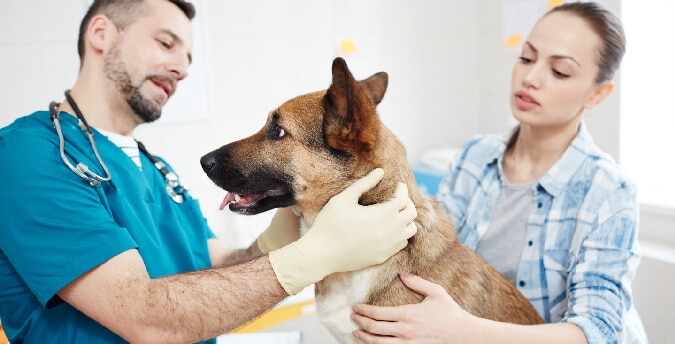Common Inherited Dog Diseases

Some dog breeds are genetically predisposed to specific health issues, some of which may be serious and life-threatening. While some conditions may require little more than extra care and preventive maintenance, intensive treatment and surgery may be necessary for more severe cases.
HIP DYSPLASIA
Hip dysplasia is a condition that affects the ball-and-socket joint that makes up the hip. The disease is relatively common; in fact, the Orthopedic Foundation for Animals (OFA) was founded with the initial goal of reducing hip dysplasia incidents in canines.
For optimal hip function, the ball will have to fit snugly into the hip socket. In canines with hip dysplasia, the abnormal development of the hip results in a cavity that doesn’t cover the ball of the upper thigh bone. This abnormality causes the cartilage in the joint to degenerate, resulting in pain and later development of arthritis.
Dogs suffering from hip dysplasia may have difficulty getting up and lying down. They may also have trouble performing typical canine actions such as going up stairs, jumping onto furniture, or even running or walking.
Hip dysplasia is preventable by maintaining the dog’s ideal weight. Treatment options include physical therapy, pain medication, surgical hip replacement, and stem cell therapy.
URINARY BLADDER STONES
Urinary bladder stones can develop in the urinary tracts of dogs. The condition can cause a great deal of pain and discomfort, and dogs may develop a range of symptoms, including difficulty or inability to urinate, uncontrolled or more frequent urination, or blood in the urine.
Urinary bladder stones can affect almost any breed of dog, although they occur more commonly in purebred dogs, such as Dalmatians, Newfoundlands, and Miniature Schnauzers.
The most common treatment for urinary bladder stones is cystotomy, which is the surgical extraction of the stones from the bladder. Doctors may also prescribe cystoscopy and laser lithotripsy. These procedures involve the insertion of a scope into the bladder, with a laser subsequently used to break up the stones into smaller fragments that can pass painlessly through the urethra.
EPILEPSY
It may surprise some dog owners to know that canines can be afflicted with epilepsy as well. Just as in humans, the effects can be very distressing. Dogs that experience grand mal seizures may stiffen and fall, salivate excessively, paddle their legs uncontrollably, and even lose control of their bowel and bladder functions.
Epileptic seizures occur when some brain cells become overly excited. They then exceed what is known as the “seizure threshold,” which is when the characteristic symptoms of epilepsy occur.
Certain breeds are more prone to epilepsy, such as German Shepherds, Beagles, Dachshunds, and Retrievers. Management of the condition typically requires one or more types of anticonvulsant medication.
HEART DISEASE
Many types of inherited cardiac diseases can affect dogs. Some breeds are especially prone to developing these conditions, including Dachshunds and Cavalier King Charles Spaniels, which may suffer from myxomatoses valve disease. This condition causes the build-up of pressure in the heart chambers, leading to weakness, poor appetite, coughing, breathing difficulties, and eventual collapse.
Breeds such as Doberman Pinschers, Great Danes, and Boxers may develop dilated cardiomyopathy, which results in enlarged and weakened hearts due to abnormal heart muscles.
DEGENERATIVE MYELOPATHY
One other common inherited canine disease is degenerative myelopathy (DM). A neurological condition that develops slowly, DM causes the nerve fibers in the spinal cord and their myelin sheath to deteriorate. The transmission of nerve signals in the middle to lower sections of the spinal cord eventually causes weakness and wobbling in the hind legs.
Dogs that develop DM may drag their hind feet, and be unable to stand. The condition eventually causes paralysis in affected dogs. Symptoms usually develop later in life, when the dog reaches middle age or older.
Although DM is a debilitating disease with no known cure, the condition doesn’t usually cause pain. Even so, the loss of strength in the hind legs causes a great deal of difficulty in urinating and defecating. In some dogs, the use of a cart or harness can restore mobility to some degree.
BRACHYCEPHALIC SYNDROME
Brachycephalic syndrome is a condition that commonly affects brachycephalic or “short-headed” dogs, such as Boston Terriers, English and French Bulldogs, Pugs, Pekingese, and Shih Tzus.
Recognizable by their “smushed faces,” these types of dogs are known for the snoring and snorting sounds they frequently make. Although these traits may seem cute or endearing, they actually result from abnormalities in their anatomy. Because of their unique head and face characteristics, brachycephalic dogs usually have elongated soft palates, narrow nostrils, and narrow windpipes.
Some of the symptoms associated with these breeds are avoidable with preventive home care and precautionary measures during hot and humid weather. In more severe cases, corrective surgery may be necessary.
